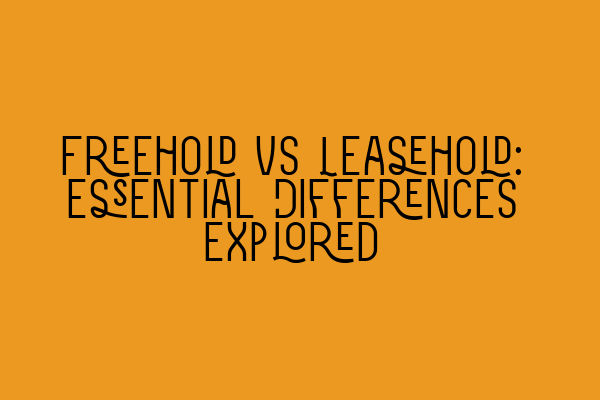Freehold vs Leasehold: Essential Differences Explored
As a solicitor at SQE Property Law & Land Law, I often come across clients who are confused about the essential differences between freehold and leasehold properties. Understanding these differences is crucial when it comes to buying or selling property, so in this blog post, I will explore the key aspects of freehold and leasehold ownership.
What is Freehold?
Let’s start with freehold. When you own a property freehold, you have complete ownership of both the building and the land it stands on. This means you have full control and responsibility for the property, including any land and structures on it. You don’t have to pay any ground rent or service charges, and you have the freedom to make any alterations or improvements to the property, subject to planning permission and building regulations.
Freehold ownership provides you with the security and permanence of outright ownership. You have the right to occupy the property indefinitely, and you can pass it on to future generations through inheritance or sale. It is worth noting that freehold properties are usually houses, although there are instances where flats or apartments may also be sold as freehold.
On the other hand, Leasehold ownership is a bit different.
Understanding Leasehold Ownership
Leasehold ownership refers to the right to occupy a property for a specific period of time, as stated in the lease agreement. When you purchase a leasehold property, you essentially enter into a contract (the lease) with the freeholder, who retains ownership of the land and the building.
Typically, leasehold properties are apartments or flats, where multiple units are owned within the same building or development. In these cases, there are usually shared spaces and communal areas, which are maintained by the freeholder or a managing agent on behalf of all leaseholders. As a leaseholder, you will be required to pay ground rent, service charges, and potentially additional fees for maintenance and repairs.
Leasehold ownership comes with certain restrictions compared to freehold. You may need permission from the freeholder to carry out any alterations or renovations to the property, and there may be limitations on subletting or having pets. The lease agreement will outline the specific terms and conditions that you must adhere to during your occupancy.
Duration of Leases
Leases for residential properties are typically long-term, ranging from 99 years to 999 years. However, it is important to remember that leasehold ownership is temporary, and once the lease term expires, ownership of the property reverts back to the freeholder unless a lease extension is agreed upon.
Lease extensions are a complex area of property law, and seeking professional advice from a solicitor is crucial if you are considering extending your lease.
Leasehold Enfranchisement
Leasehold enfranchisement is another important aspect to consider when it comes to leasehold properties. It refers to the process through which leaseholders have the right to collectively purchase the freehold of their building. This allows leaseholders to take control of the management and maintenance of the property, providing them with greater control and potentially reducing costs.
Seeking Legal Advice
Now that you have a better understanding of the essential differences between freehold and leasehold properties, it is important to seek professional legal advice when buying or selling property. Expert solicitors, such as those at SQE Property Law & Land Law, can guide you through the intricacies of property law, ensuring a smooth and successful transaction.
If you want to assess your knowledge on property law or prepare for the SQE 1 exams, SQE 1 Practice Exam Questions and SQE 1 Practice Mocks FLK1 FLK2 articles will be highly beneficial. If you are preparing for the SQE 2 exams, our SQE 2 Preparation Courses article will provide you with essential guidance. And if you’re interested in general SQE 1 preparation, you can explore the SQE 1 Preparation Courses article.
Finally, if you’re in need of information regarding SRA SQE exam dates, our SRA SQE Exam Dates article will keep you updated on the latest examination schedules.
Remember, when it comes to property ownership, being well-informed and seeking professional advice is key. So, whether you’re considering purchasing a freehold or leasehold property, make sure you understand the essential differences and seek legal assistance to navigate through the process smoothly.
